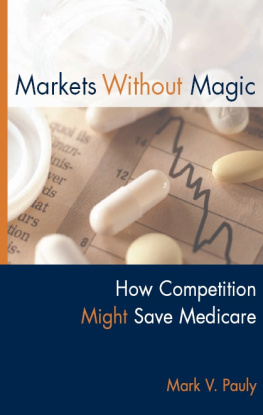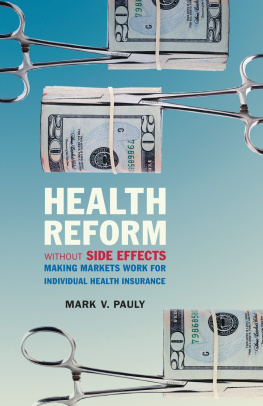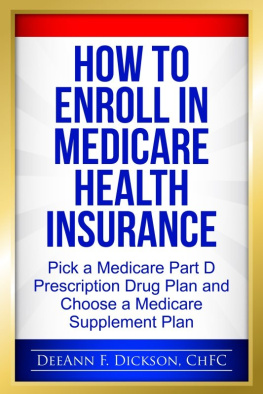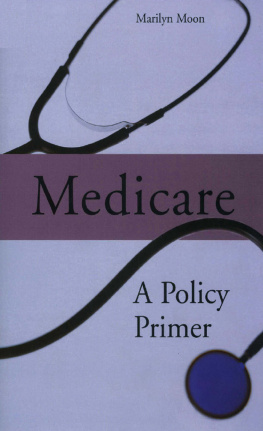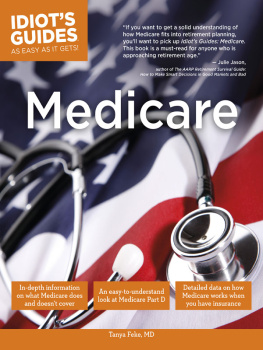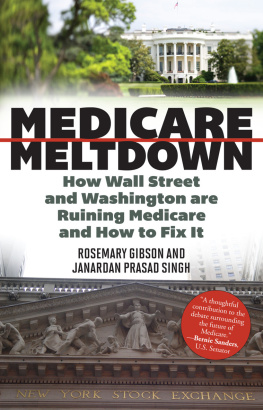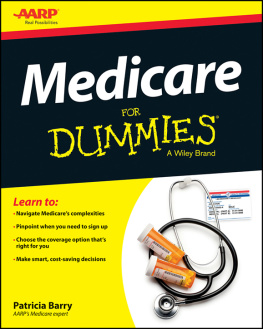Mark V. Pauly - Markets Without Magic: How Competition Might Save Medicare (AEI Studies On Medicare Reform)
Here you can read online Mark V. Pauly - Markets Without Magic: How Competition Might Save Medicare (AEI Studies On Medicare Reform) full text of the book (entire story) in english for free. Download pdf and epub, get meaning, cover and reviews about this ebook. year: 2008, publisher: AEI Press, genre: Business. Description of the work, (preface) as well as reviews are available. Best literature library LitArk.com created for fans of good reading and offers a wide selection of genres:
Romance novel
Science fiction
Adventure
Detective
Science
History
Home and family
Prose
Art
Politics
Computer
Non-fiction
Religion
Business
Children
Humor
Choose a favorite category and find really read worthwhile books. Enjoy immersion in the world of imagination, feel the emotions of the characters or learn something new for yourself, make an fascinating discovery.
- Book:Markets Without Magic: How Competition Might Save Medicare (AEI Studies On Medicare Reform)
- Author:
- Publisher:AEI Press
- Genre:
- Year:2008
- Rating:5 / 5
- Favourites:Add to favourites
- Your mark:
- 100
- 1
- 2
- 3
- 4
- 5
Markets Without Magic: How Competition Might Save Medicare (AEI Studies On Medicare Reform): summary, description and annotation
We offer to read an annotation, description, summary or preface (depends on what the author of the book "Markets Without Magic: How Competition Might Save Medicare (AEI Studies On Medicare Reform)" wrote himself). If you haven't found the necessary information about the book — write in the comments, we will try to find it.
Mark V. Pauly: author's other books
Who wrote Markets Without Magic: How Competition Might Save Medicare (AEI Studies On Medicare Reform)? Find out the surname, the name of the author of the book and a list of all author's works by series.
Markets Without Magic: How Competition Might Save Medicare (AEI Studies On Medicare Reform) — read online for free the complete book (whole text) full work
Below is the text of the book, divided by pages. System saving the place of the last page read, allows you to conveniently read the book "Markets Without Magic: How Competition Might Save Medicare (AEI Studies On Medicare Reform)" online for free, without having to search again every time where you left off. Put a bookmark, and you can go to the page where you finished reading at any time.
Font size:
Interval:
Bookmark:
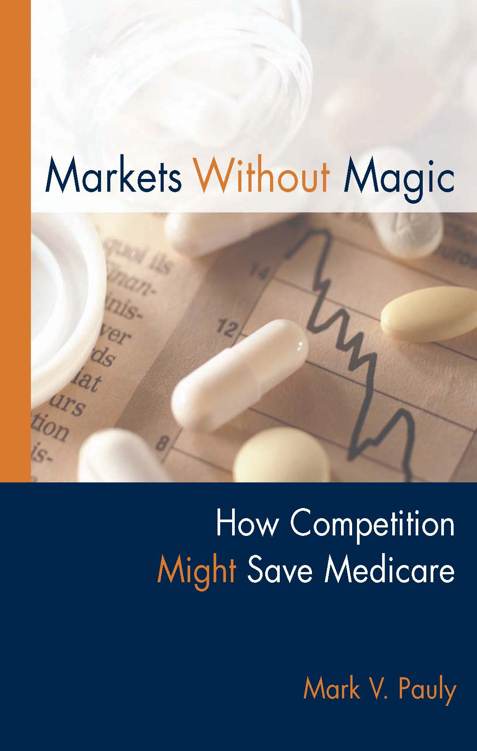
AEI STUDIES ON MEDICARE REFOR M Joseph Antos and Robert B. Helms
Series Editors
What ails Medicare is what ails health care in America. Medicare spending is growing substantially faster than we can afford, with potentially disastrous consequences for the federal budget. Worse, although the program is paying for more services, it is not necessarily providing better care for the elderly and the disabled. AEIs Studies on Medicare Reform is designed to examine the programs operation, consider alternative policy options, and develop a set of realistic proposals that could form the basis for reform legislation.
T HE D IAGNOSIS AND T REATMENT OF M EDICARE
Andrew J. Rettenmaier and Thomas R. Saving
M ARKETS W ITHOUT M AGIC: H OW C OMPETITION M IGHT S AVE M EDICAR E
Mark V. Pauly
The AEI Press
Publisher for the American Enterprise Institute
WASHINGTON, D.C.
Distributed to the Trade by National Book Network, 15200 NBN Way, Blue Ridge Summit, PA 17214. To order call toll free 1-800-462-6420 or 1-717-794-3800. For all other inquiries please contact the AEI Press, 1150 Seventeenth Street, N.W., Washington, D.C. 20036 or call 1-800-862-5801.
Library of Congress Cataloging-in-Publication Data
Pauly, Mark V., 1941
Markets without magic : how competition might save Medicare / Mark V. Pauly.
p. cm.
Includes bibliographical references. ISBN 13: 978-0-8447-4261-8 (pbk.) ISBN-10: 0-8447-4261-9
1. MedicareFinance. 2. MedicareEconomic aspects.
3. CompetitionUnited States. 4. Health care reformUnited States.
I. Title.
[DNLM: 1. Medicareeconomics. 2. Economic CompetitionUnited States. 3. Financing, GovernmentUnited States. 4. Health Care Reformorganization & administrationUnited States. 5. Insurance, HealtheconomicsUnited States. WT 31 P333m 2008]
RA412.3.P39 200 8 368.38'200681dc22
2008007010 12 11 10 09 08 1 2 3 4 5
2008 by the American Enterprise Institute for Public Policy Research, Washington, D.C. All rights reserved. No part of this publication may be used or reproduced in any manner whatsoever without permission in writing from the American Enterprise Institute except in the case of brief quotations embodied in news articles, critical articles, or reviews. The views expressed in the publications of the American Enterprise Institute are those of the authors and do not necessarily reflect the views of the staff, advisory panels, officers, or trustees of AEI.
Printed in the United States of America
INTRODUCTION
2. WHAT C AN G O R IGHT , AND W HAT C AN G O W RONG ? 19
3. HOW M ANY P LANS ? 29
4. WHAT K IND OF C OMPETITION ? 43
5. PAINFUL BUT U NAVOIDABLE A DJUSTMENT
6. MARKETS W ITHOUT M AGIC
C ONCLUSION 61 N OTES 65 R EFERENCES
A BOUT THE A UTHOR
v
Medicare is consistently rated as one of the federal governments most valued programs. Seniors give it strong support, and even taxpayers generally favor it. This is surprising, given that it is a government-managed insurance program, with the government setting the prices for most of the services provided to beneficiaries.
The surprise may be greatest for those who believe competitive markets generally do a better job of achieving productive efficiency and consumer satisfaction than government-run firms paying with government-administered prices. Given the popularity (up to this point) of the government administration model as compared to more market-based arrangements, what can we say about the choice between those two broad organizational forms for the Medicare of the future? Given its current structure, the costs of Medicare relative to the size of the economy are sure to rise, mak ing questions about the performance of, and preferences for, todays system virtually inevitable. This monograph investigates whether greater use of competitive market-type arrangements might answer those questions.
Generally, I believe that unique (and favorable) financial circumstances in the past have been responsible for the relatively good performance of Medicare to date, which is why so many people have a positive view of the program. However, unavoidable changes in these circumstances will eventually make that model much less effective than market-based institutions. I argue that social health insurance for the elderly and disabled in anything like its current form cannot continue to function as it does now. Specifically, I argue that the effects of dramatic demographic changes, which will increase the
share of the population on Medicare, combined with a continued growth in medical costs driven by technology, will lead inevitably to a financial crisis if the conduct of the program stays as it is. There is no magic that can preserve Medicare as we know it today.
While limits to key financial aspects of the Medicare program are almost certainly unavoidable, I believe they would be best and least painfully implemented through market-based choices, rather than government direction. Not all is gloom and doom. The structure needed to make Medicare work well in this challenging future envi ronment is one that relies largely on the availability of private insurance alternatives to the traditional government-managed Medicare fee-for-service insurance. This structure is, thankfully, already in place, tested, and functioning. The key policy decision here is a negative one: to avoid making changes that weaken the ability of private alternatives to survive and function. Policy should strengthen, not abolish, this structure, even at some short-run cost. Some elements of the current system (primarily applying to the traditional Medicare plan) need to be modified to do so, but the most important modification I advocate is a change in policy perspective that recognizes the substantial merit, and perhaps the necessity, of maintaining private options in the future world of constrained Medicare (and national health expenditure) budgets.
We do have much to be sober about. On the benefits side, the need for access to ever more effective medical care for seniors will continue to grow; its provision can be facilitated by a modified version of Medicare (and not by the traditional approach). But the financing side, whether measured by financial burdens on seniors or tax burdens on others, is bound to worsen. Market-based arrangements will make the best of this bad lot.
Some background on the Medicare program is essential to the discussion ahead. A federal health insurance program for persons ages sixty-five and older, as well as some individuals with disabilities, Medicare covers over 43 million Americans and is expected to spend $475 billion in 2008. Medicare offers benefits under Part A (hospital insurance), Part B (supplementary medical insurance), Part C (Medicare Advantage program), and Part D (prescription drug coverage).
Part A. Medicare Part A helps pay for hospital visits, home health services, nursing facilities, and hospice care. It is funded by payroll taxes totaling 2.9 percent of total earnings (half paid by the employee and half by the employer). Individuals are entitled to coverage under Part A if they have a sufficient period of covered employment. Beneficiaries are subject to cost-sharing requirements, including an initial deductible for hospitalization (equal to the cost of the first day of care, or $1,024 in 2008) and coinsurance for long hospital stays or the use of nursing home care.
Font size:
Interval:
Bookmark:
Similar books «Markets Without Magic: How Competition Might Save Medicare (AEI Studies On Medicare Reform)»
Look at similar books to Markets Without Magic: How Competition Might Save Medicare (AEI Studies On Medicare Reform). We have selected literature similar in name and meaning in the hope of providing readers with more options to find new, interesting, not yet read works.
Discussion, reviews of the book Markets Without Magic: How Competition Might Save Medicare (AEI Studies On Medicare Reform) and just readers' own opinions. Leave your comments, write what you think about the work, its meaning or the main characters. Specify what exactly you liked and what you didn't like, and why you think so.

